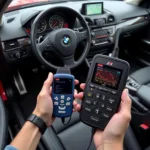Bluetooth OBD2 scanners have become increasingly popular due to their convenience and affordability. They allow you to easily diagnose car problems and monitor your vehicle’s performance using your smartphone. But a common question arises: is it safe to leave these devices plugged in all the time?
This comprehensive guide delves into the safety aspects of leaving Bluetooth OBD2 scanners connected to your vehicle, addressing potential risks, best practices, and providing expert insights to help you make informed decisions about your car’s health and security.
Understanding Bluetooth OBD2 Scanners and How They Work
Before we dive into the safety concerns, it’s helpful to understand what Bluetooth OBD2 scanners are and how they function. These devices plug into your vehicle’s OBD2 port, typically located under the dashboard on the driver’s side.
Once connected, the scanner communicates with your car’s computer, retrieving data from various sensors and systems. This data is then transmitted wirelessly via Bluetooth to your smartphone or tablet, where you can view it using a companion app.
Potential Risks of Leaving Bluetooth OBD2 Scanners Plugged In
While Bluetooth OBD2 scanners offer significant benefits, leaving them constantly connected does come with potential risks, albeit relatively small:
1. Battery Drain
One concern is potential battery drain. While most modern scanners are designed for low power consumption, leaving them plugged in continuously, especially in older vehicles, might contribute to a slightly faster battery discharge, particularly if the vehicle sits idle for extended periods.
2. Security Vulnerabilities
Although rare, there’s a theoretical risk of security vulnerabilities. If the Bluetooth connection between the scanner and your phone isn’t adequately secured, it could potentially be exploited by malicious actors to access your vehicle’s data. However, this risk is minimal with reputable brands using robust security protocols.
3. Data Privacy Concerns
Some users express concerns about data privacy. Since the scanner accesses and transmits vehicle data, there’s a theoretical possibility of this data being collected or intercepted, particularly if using apps with inadequate privacy measures. Opting for reputable apps and scanners from trusted manufacturers can mitigate this risk.
Best Practices for Using Bluetooth OBD2 Scanners Safely
To maximize the benefits of your Bluetooth OBD2 scanner while minimizing potential risks, consider these best practices:
- Unplug When Not in Use: The simplest way to avoid potential battery drain is to unplug the scanner when you’re not actively using it, especially for overnight parking or extended periods of inactivity.
- Use Strong Passwords and Secure Connections: Ensure your Bluetooth connection uses a strong, unique password, and avoid pairing the device with untrusted phones or in public areas with open Wi-Fi networks.
- Choose Reputable Brands and Apps: Opt for OBD2 scanners from well-known brands known for their security and privacy practices. Similarly, download companion apps from reputable developers with a strong track record in data security.
Expert Insights
We spoke to automotive electronics expert, Dr. Emily Carter, who shared her perspective:
“While the risks associated with leaving Bluetooth OBD2 scanners plugged in are generally low, it’s always best to err on the side of caution. Unplugging the device when not in use is a simple habit that can alleviate most concerns.”
Conclusion
Bluetooth OBD2 scanners are valuable tools for car owners, offering a convenient way to monitor their vehicles and diagnose issues. While leaving them plugged in poses minimal risks, adopting simple precautions such as unplugging when not in use and prioritizing reputable brands can provide peace of mind and ensure safe and secure operation.
By staying informed and following these guidelines, you can enjoy the convenience and insights offered by these devices while safeguarding your vehicle’s battery, security, and data privacy.
obd2 computers can provide valuable information about your vehicle’s performance. Learn more about how they work and their benefits.
FAQ
1. Can leaving a Bluetooth OBD2 scanner plugged in damage my car?
It’s highly unlikely that leaving a Bluetooth OBD2 scanner plugged in will cause any damage to your vehicle, especially modern cars with robust electrical systems.
2. Does a Bluetooth OBD2 scanner drain the battery when the car is off?
While the power draw is minimal, some scanners might contribute to a slow battery drain over time, particularly in older vehicles.
3. How do I know if my Bluetooth OBD2 scanner is securely connected?
Check your phone’s Bluetooth settings to ensure the connection is encrypted and uses a strong password.
4. Can someone hack my car through the OBD2 port with a Bluetooth scanner?
While theoretically possible, the likelihood is extremely low with a reputable scanner and strong Bluetooth security.
5. How often should I unplug my Bluetooth OBD2 scanner?
It’s best practice to unplug it when not actively using it, especially for overnight parking or extended periods.
Common Scenarios
-
Scenario 1: You’re on a road trip and want to monitor your car’s performance in real time. In this case, leaving the scanner plugged in is beneficial.
-
Scenario 2: You’ve parked your car at the airport for a week-long trip. Unplugging the scanner is recommended to avoid potential battery drain.
Explore Further
Learn more about specific OBD2 error codes, such as obd2 p2119, and how to troubleshoot them.
Need assistance choosing the right OBD2 scanner or have questions about your vehicle’s diagnostics? Our team of experts is here to help 24/7. Contact us via WhatsApp: +1(641)206-8880, Email: cardiagtechworkshop@gmail.com.
